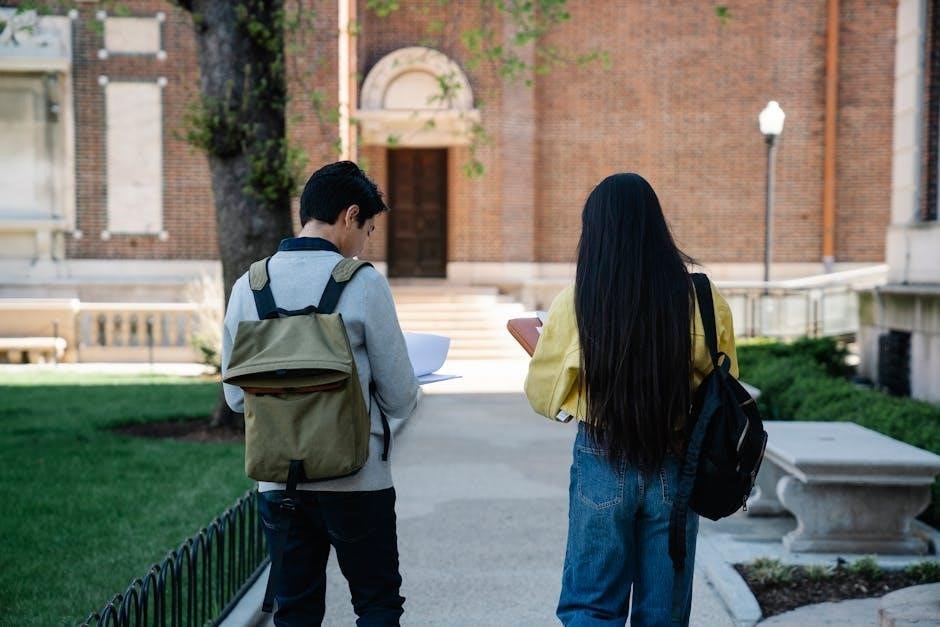The Nebraska Learners Permit is a crucial step toward obtaining a driver’s license, allowing new drivers to practice under supervision․ This guide provides essential insights and preparation materials to help applicants understand the rules of the road, traffic laws, and safe driving practices․
1․1 Overview of the Learners Permit in Nebraska
A Nebraska Learners Permit is a temporary license allowing new drivers to practice under supervision․ It is designed for individuals of specific age groups seeking to gain driving experience․ The permit authorizes operation of passenger cars and certain farm vehicles under strict conditions․ Applicants must meet eligibility criteria, pass a vision test, and provide required documentation to obtain this permit, serving as a pathway to a full driver’s license․
1․2 Importance of the Study Guide
The study guide is a vital resource for preparing for the Nebraska Learners Permit test, offering detailed insights into traffic laws, road signs, and safe driving techniques․ It helps applicants understand the rules of the road and ensures they are well-prepared for the written exam․
By using the guide, new drivers can build confidence and improve their knowledge, ensuring a smooth transition to obtaining a full driver’s license while adhering to Nebraska’s driving regulations․
Eligibility Requirements for a Nebraska Learners Permit
To qualify for a Nebraska Learners Permit, applicants must meet specific criteria, including age requirements and providing necessary documentation, such as proof of identity and residency․
2․1 Age Requirements
In Nebraska, applicants for a Learners Permit must meet specific age criteria․ The minimum age to apply for a School Learners Permit (LPE) is 15 years old, while the standard Learners Permit (LPD) requires applicants to be at least 16 years old․ Applicants under 18 must complete a state-approved driver education course or a 50-hour certification, including nighttime driving hours․ Supervised driving is mandatory during this period․
2․2 Documentation Needed
To apply for a Nebraska Learners Permit, you must provide specific documentation․ This includes proof of identity, such as a birth certificate or valid passport, and proof of residency, like a utility bill or bank statement․ Additionally, you must submit a Social Security number verification and a completed parental consent form if you are under 18․ All documents must be originals or certified copies․

Steps to Apply for a Nebraska Learners Permit
Applying for a Nebraska Learners Permit involves submitting your application, passing a vision test, and completing a written exam․ Approval leads to receiving your permit․
3․1 Completing the Application Form
Completing the application form is the first step in obtaining a Nebraska Learners Permit․ You must provide proof of identity, residency, and legal status․ The form can be filled out online or in person at the DMV․ Ensure all information is accurate, as errors may delay processing․ Minors require parental or guardian consent․ This step sets the foundation for the rest of the application process․
3․2 Vision Test and Written Exam
A vision test is required to ensure applicants can safely operate a vehicle․ The written exam covers traffic laws, signs, and safe driving practices․ Study materials, such as the Nebraska Driver’s Manual, are essential for preparation․ The test is multiple-choice, and a passing score is necessary to obtain the Learners Permit․ Proper preparation helps applicants succeed on their first attempt․

What to Study for the Nebraska Learners Permit Test
Focus on understanding traffic laws, road signs, and safe driving practices․ Study the Nebraska Driver’s Manual to master these key areas and ensure readiness for the exam․
4․1 Traffic Laws and Signs
Understanding Nebraska’s traffic laws and road signs is essential for safe driving․ Study regulatory signs like stop and yield, warning signs for curves or intersections, and guide signs for directions․ Familiarize yourself with laws on speed limits, right-of-way rules, and prohibited actions․ Reviewing the Nebraska Driver’s Manual will help master these concepts and ensure readiness for the written exam․ Focus on common violations to avoid mistakes․
4․2 Safe Driving Practices
Safe driving practices are critical for reducing accidents and ensuring roadway safety․ Topics include defensive driving techniques, sharing the road with pedestrians and cyclists, and managing speed limits․ Learn how to maintain a safe following distance and adjust driving habits for varying weather conditions․ Understanding the risks of distracted driving and the importance of seatbelt use is also emphasized․ These practices help build responsible driving habits․
Practice Tests and Resources
Online practice tests and study guides are essential for preparing for the Nebraska Learners Permit exam․ They provide realistic questions and detailed explanations to ensure readiness․
5․1 Online Practice Tests
Online practice tests are an excellent way to prepare for the Nebraska Learners Permit exam․ These tests simulate real exam conditions, offering questions on traffic laws, road signs, and safe driving practices․ They provide immediate feedback and detailed explanations, helping learners identify areas for improvement․ Many platforms offer free or paid practice tests, making it convenient to study at home․ Regular use of these resources significantly boosts exam readiness and confidence․
5․2 Study Materials and Guides
Official Nebraska DMV study guides and handbooks are indispensable resources for preparing for the Learners Permit exam․ These materials cover essential topics such as traffic laws, road signs, and safe driving practices․ Additional resources, including DVDs and mobile apps, offer interactive learning experiences․ These guides provide detailed explanations and practical examples, ensuring a comprehensive understanding of driving rules and regulations․ They are ideal for both visual and hands-on learners․

Restrictions on a Nebraska Learners Permit
A Nebraska Learners Permit imposes specific driving restrictions to ensure safety and proper learning․ These rules help new drivers gain experience gradually and responsibly․
6․1 Driving Hours and Accompaniment Rules
In Nebraska, learners permit holders must be accompanied by a licensed driver aged 21 or older in the front passenger seat․ Driving is restricted to daylight hours unless supervised by a licensed driver․ These rules ensure new drivers gain experience safely and responsibly, minimizing risks on the road while learning essential driving skills․ Adhering to these guidelines is crucial for progressing to a full license․
6․2 Prohibited Actions While Driving
Holders of a Nebraska Learners Permit are prohibited from using cell phones while driving, including texting․ They must not drive without a licensed adult in the front seat․ Additionally, they are not allowed to carry more than one passenger unless supervised․ These restrictions aim to minimize distractions and ensure a safe learning environment for new drivers․

Moving from a Learners Permit to a Drivers License
Transitioning from a learners permit to a drivers license in Nebraska requires meeting specific requirements, including completing supervised driving hours and passing a driving test․ This process ensures new drivers are prepared for unsupervised driving privileges․
7․1 Requirements for a Provisional License
To qualify for a provisional license in Nebraska, applicants must be at least 16 years old, hold a learners permit for six months, and complete 50 hours of supervised driving, including 10 hours of nighttime driving․ A parent or guardian must certify the completion of these requirements․ Additionally, passing a vision test and providing all necessary documentation is mandatory․
7․2 Scheduling and Passing the Driving Test
Once eligible, schedule the driving test with the Nebraska DMV by phone or online․ During the test, demonstrate safe driving skills, such as proper vehicle control, signaling, and adherence to traffic laws․ A licensed driver must accompany you to the test․ Passing the test allows progression to a provisional license, moving closer to full driving privileges․ Proper preparation and practice are key to success․

Common Mistakes to Avoid
Common mistakes include misinterpreting traffic signs, forgetting to signal, and errors in parallel parking․ Avoid distractions and ensure proper vehicle control during the driving test․
8․1 Errors During the Written Test
Common errors on the written test include misreading questions, neglecting traffic laws, and misunderstanding road signs․ Carefully review each question and ensure a thorough understanding of Nebraska’s driving rules and regulations before answering․ Time management is key, so allocate enough time to each section to avoid rushed decisions․ Practice with online tests to identify and correct these mistakes․
8․2 Errors During the Driving Test
Common mistakes during the driving test include failure to check mirrors, improper lane changes, and insufficient signaling․ Many applicants also struggle with parallel parking, three-point turns, and maintaining consistent speeds․ Examiners pay close attention to adherence to traffic laws and safe driving practices․ To improve, practice these maneuvers regularly and focus on smooth, deliberate actions․ Arrive early and stay calm to ensure the best performance․

Additional Resources and Support
For further assistance, the Nebraska DMV offers detailed guides and contact information․ Community groups and online forums provide peer support and shared experiences to aid in your learning journey․
9․1 Nebraska DMV Contact Information
The Nebraska Department of Motor Vehicles (DMV) offers multiple ways to contact them․ Visit their official website for detailed information, or call their customer service hotline․ You can also visit a local DMV office in person for assistance with your learner’s permit application or any related inquiries․ Additionally, they provide online forms and email support for convenient communication․
9․2 Community and Online Support Groups
Joining community and online support groups can provide valuable resources and encouragement for learners permit applicants․ These groups often share study tips, personal experiences, and advice on preparing for the exam․ Online forums and social media communities dedicated to driver education can also offer helpful insights and answers to common questions․ Engaging with these networks can enhance your learning experience and build confidence․
